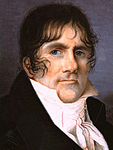1797 French legislative election
| |||||||||||||||||||||||||||||
A third of the seats in the Council of Five Hundred and the Council of Elders, as well as vacant seats | |||||||||||||||||||||||||||||
|---|---|---|---|---|---|---|---|---|---|---|---|---|---|---|---|---|---|---|---|---|---|---|---|---|---|---|---|---|---|
| |||||||||||||||||||||||||||||
 Composition of the National Assembly | |||||||||||||||||||||||||||||
| |||||||||||||||||||||||||||||
The French Directory election of 1797 was held between 21 March and 2 April 1797 to elect a third of the Legislative Body of the Directory, that is to say 2/3 of the lower house, the Council of Five Hundred and the upper house, the Council of Ancients. The 1797 election marks the beginning of the 1/3 vote of its type. An election occurs each year with a third of the deputies up for election.
Context[]
Following the events of the Conspiracy of Equals, the Jacobins and Montagnards lose their majority in the house simply by supporting François-Noël Babeuf. These leads to a massive pro-Royalist push in the country and even more so following the end of the impending end to the War of the First Coalition in site.[1]
Though the Royalists disagreed on who they would want to see as the proper pretender to the throne, they did in-fact agree that legally being elected would be the only means which they would re-establish the monarchy. Then, they would call for the dissolution of the Directory, but see the recreation of the Constitution of 1791 with a new National Assembly. The Royalists were also divided on the future however, with the Absolutists (later known as the Ultra Royalists) preferring a return to the absolute Ancien Régime under Louis, Count of Provence (future Louis XVIII) and supported the now two-year old Quiberon Expedition. The 'Constitutionalists' (later known as the Liberals or Doctrinaires) favoured a constitutional monarchy in addition to supporting individual rights and property in addition to freedoms and fair elections. The constitutionalists later began meeting at the 'Clichy Club', hence the new name, in addition to their nickname, the 'Clichyens'.[2][3]
Results[]
Following the election, the Royalists gained a supermajority, and an even larger one than what was expected. The Directory now comprised 182 new deputies of pro-constitutional monarchy, 44 ultra-royalists, and 34 republicans. Among the later included two new Jacobins, Joseph Bonaparte and Jean-Baptiste Jourdan. In addition to the nearly 200 new seats taken by the Royalists, there were around 100 other royalist deputies already present and more than 130 other deputies likely to accept a constitutional monarchy.[4]
Less than six months after the election, fearing a return to the monarchy, the Coup of 18 Fructidor is carried out. The coup removed all those accused of being "pro-Monarchist" or those who had supported those deputies. According to most historians, the coup marked the beginning of the "Second Directory period" which is described as the "Authoritarian Directory".[5][6]
| Seats up for election | ||||
|---|---|---|---|---|
| Party | Leader | Seats | % | |
| Clichy Club | Mathieu Dumas | 105 | 59.32% | |
| Maraisards | Lazare Carnot | 44 | 24.86% | |
| Thermidorians | Paul Barras, Vicomte de Barras | 28 | 15.82% | |
| Total | 177 | 100% | ||
Footnotes[]
References[]
- Woronoff, Denis (2004). La République bourgeoise de Thermidor à Brumaire 1794-1799. France: Éditions du Seuil. ISBN 978-2757846704. OCLC 1191043797.
- Tulard, Jean (1991). Le Directory et le Consulat. History of Socialism in France. France: Presses Universitaires de France. ISBN 978-2130439806. OCLC 802676216.
- le Bozec, Christine (2014). La Première République, 1792 – 1799. Paris, France: Éditions Perrin. ISBN 978-2262040918. OCLC 871312113.
- French election stubs
- 1797
- 1797 in France
- 1797 events of the French Revolution
- 18th-century elections in France
- 18th-century elections in Europe
- French Directory
- Legislative elections in France


